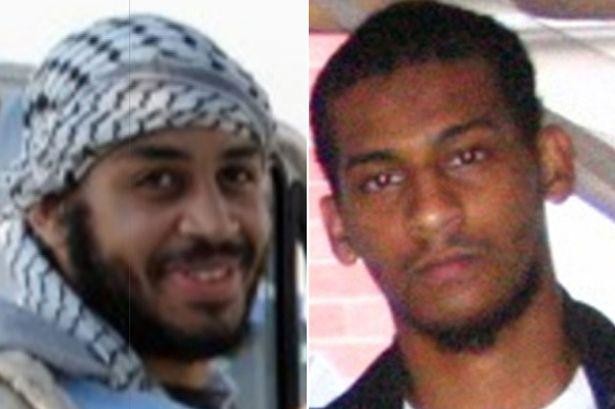LONDON: Daesh militant Alexanda Kotey, known for his part in a brutal murder squad, is thought to have been fleeing to Turkey when he was seized by US-backed Kurdish forces in northern Syria.
Kotey, 34, along with El Shafee Elsheikh, 29, was part of a notorious Daesh execution cell, known for participating in the brutal beheadings and torture of hostages, who knew them as the “Beatles” because of their British accents. “He was intending to escape toward Turkey with cooperation and coordination with friends of his on the Turkish side,” senior SDF official Redur Xelil told Reuters. “He is now under investigation with us,” he added. No information on Elsheikh was provided. A senior security official in Turkey described the claim as “nonsense.”
The pair were detained in January but American officials initially kept the news secret “to allow analysts more time to pursue the intelligence leads,” The New York Times said.
UK officials described the capture as a potential “treasure trove” of intelligence and are hoping to glean information on the whereabouts of John Cantlie, the British journalist captured by Daesh in 2012 alongside US journalist James Foley, who was beheaded in 2014.
Kotey and Elsheikh are already believed to have supplied valuable intelligence and could provide important insights on foreign fighters disbanded by the collapse of the so-called caliphate.
Tahir Abbas, a senior research fellow specializing in Islamophobia and radicalization at RUSI, a London-based think tank, told Arab News that their capture presented “vital and valuable opportunities” to gain greater insights into the workings of Daesh. “These individuals carry with them all sorts or knowledge and understanding of what went on inside” as well as “how people came from the UK and other European countries to Syrian and Iraq.”
Kotey, described by friends as a “quiet and humble” football fan of Ghanaian-Greek Cypriot origin, acted as a recruiter for Daesh and is believed to have encouraged several UK nationals to join the group. According to the US State Department, he “likely engaged in the group’s executions and exceptionally cruel torture methods, including electronic shock and waterboarding.”
Elsheikh also participated in the torture and had a reputation for “waterboarding, mock executions, and crucifixions” the US State Department said.
The cell’s frontman was Mohamed Emwazi, known as Jihadi John, who became notorious after appearing in Daesh propaganda videos depicting the execution of Western hostages, including Foley, UK aid workers David Haines and Alan Henning, US aid worker Abdul-Rahman Kassig and Japanese hostage Kenji Goto. He was killed in a US drone strike in 2015 following an extensive manhunt.
According to US officials the cell beheaded at least 27 Western hostages and was responsible for torturing many more. They were known for their brutality, frequently beating the hostages they held in Raqqa, who knew them by their Beatles names — Ringo, Paul, John and George.
A fourth member of the group Aine Davis is imprisoned in Turkey after being arrested near Istanbul in 2015. Like the others, Davis lived in West London, where they are believed to have met before traveling to Syria to join Daesh.
There is now speculation over whether the pair, who may have had their British citizenships revoked under powers available to the UK Home Office, will be repatriated to the UK or put on trial in the US. Their capture by US forces and alleged participation in the killing of US hostages could see some in the Trump administration push for them to be moved to Guantanamo Bay.
In his State of the Union address last month, Trump announced a decision to keep the controversial detention facility open: “I am asking Congress to ensure that in the fight against Isis and Al-Qaeda we continue to have all necessary power to detain terrorists wherever we chase them down, wherever we find them. And in many cases, for them, it will now be Guantanamo bay.”
Both UK MP Tobias Ellwood, whose brother was killed in a terrorist attack in Bali in 2002, and the mother of James Foley, have called for the pair to receive a fair trial. Diane Foley told the BBC: “I would like them to be brought to trial in the US but as long as they are brought to fair trial and detained and justice is served I would be most grateful.
“It does not bring James back but hopefully it protects others from this kind of crime.”
“I would like them to spend the rest of their lives being detained in a prison.”
Speaking on BBC Radio 4, Nicolas Henin, a former hostage who was held for 10 months, described the cell’s cruel treatment of captives. “I don’t like the word but yes, some of us have been tortured,” he said, adding that the men’s accents had clearly identified them as British.
“I will be extremely frustrated if they are not offered a fair trial, and I don’t think that the local authorities in northern Syria or that detention in Guantanamo would be justice,” he said. “I would like them brought back to Britain.”
All four members of the group are believed to have been radicalized in London. Kotey, a father of two who converted to Islam in his twenties, joined an aid convoy to Gaza in 2009 and never returned. Investigators believe he became radicalized while attending Al-Manaar mosque in Ladbroke Grove, alongside Emwazi.
“It’s right that they are returned to the UK and face justice accordingly,” Abbas, the research fellow at RUSI, said. “Yes they carried out undoubtedly heinous acts but they were, if their citizenship hasn’t been revoked, British citizens, who still have a claim to their Britishness on some level and we as a state should acknowledge that and process them through the justice system — that would be the right and fair thing to do and it would send the right signals.”
Elsheikh and his younger brother Mahmoud, who was killed while fighting for Daesh in Iraq, came from a family of Sudanese refugees. His mother Maha Elgizouli claimed her “perfect” son was influenced by the sermons of a radical West London Islamist cleric, Hani Al-Sibai, who once described the London bombings as a “great victory” for Al-Qaeda.
Egyptian-born Al-Sibai, 55, has been linked to numerous extremists, including Emwazi and Elsheikh, and is cited as an influence on the Tunisian terror group that trained Seifeddine Rezgui Yacoubi before he killed 38 tourists on a Tunisian beach in 2015.
Elgizouli said in an interview that she confronted the cleric and slapped him, saying “What have you done to my son?” After learning that Elsheikh was involved with the groups, she said: “That boy now is not my son. That is not the son I raised.”
Despite attempts by successive British governments to deport Al-Sibai he continues to live in West London.
The UK Home Office has faced similar problems with radical preachers in the past, notably Egyptian-born cleric Abu Hamza Al-Masri and Jordanian Abu Qatada, who was eventually deported to Jordan in 2014.
A report published in Oct. 2017 by The Soufan Center found that thousands of Daesh fighters had already returned to their home countries, including at least 425 to the UK — more than any other country in Europe.
How four British extremists went from West London to heading a brutal Daesh death cell
How four British extremists went from West London to heading a brutal Daesh death cell

King Charles to attend Canada’s state opening of parliament

LONDON: Britain’s King Charles will attend Canada’s state opening of parliament in Ottawa, Buckingham Palace said on Friday, in a clear show of support for the former British colony of which he is still head of state.
Charles, along with his wife Queen Camilla, will visit Canada from May 26 to May 27, the palace said.
The monarch’s attendance comes after his recent acknowledgment that he is also the king of Canada, a country that US President Donald Trump has made clear he has designs on.
The visit to Canada would be Charles’ second overseas trip this year, after his visit to Italy where he held a private meeting with Pope Francis before the pontiff’s demise.
German spy agency brands far-right AfD as ‘extremist’, opens way for closer surveillance

- A 1,100-page experts’ report found the AfD to be a racist and anti-Muslim organization
- The BfV agency needs such a classification to be able to monitor a political party
BERLIN: Germany’s spy agency on Friday classified the far-right Alternative for Germany (AfD) as “extremist,” enabling it to step up monitoring of the country’s biggest opposition party, which decried the move as a “blow against democracy.”
A 1,100-page experts’ report found the AfD to be a racist and anti-Muslim organization, a designation that allows the security services to recruit informants and intercept party communications, and which has revived calls for the party’s ban.
“Central to our assessment is the ethnically and ancestrally defined concept of the people that shapes the AfD, which devalues entire segments of the population in Germany and violates their human dignity,” the BfV domestic intelligence agency said in a statement.
“This concept is reflected in the party’s overall anti-migrant and anti-Muslim stance,” it said, accusing the AfD of stirring up “irrational fears and hostility” toward individuals and groups.
The BfV agency needs such a classification to be able to monitor a political party because it is more legally constrained than other European intelligence services, a reflection of Germany’s experience under both Nazi and Communist rule.
Other organizations classified as extremist in Germany are neo-Nazi groups such as the National Democratic Party (NDP), Islamist groups including Islamic State, and far-left ones such as the Marxist-Leninist Party of Germany.
The agency was able to act after the AfD last year lost a court case in which it had challenged its previous classification by the BfV as an entity suspected of extremism.
The move follows other setbacks the far-right across Europe has suffered in recent months as it seeks to translate surging support into power. They include a ban on France’s Marine Le Pen contesting the 2027 presidential election after her embezzlement conviction, and the postponement of Romania’s presidential vote after a far-right candidate won the first round.
“VERY SERIOUS. After France and Romania, another theft of Democracy?” wrote Matteo Salvini, deputy Italian prime minister and leader of far-right party, the League, on X.
The AfD denounced its designation as a politically motivated attempt to discredit and criminalize it.
“The AfD will continue to take legal action against these defamatory attacks that endanger democracy,” co-leaders Alice Weidel and Tino Chrupalla said in a statement.
A BAN?
German parliament could now attempt to limit or halt public funding for the AfD — but for that authorities would need evidence that the party is explicitly out to undermine or even overthrow German democracy.
Meanwhile, civil servants who belong to an organization classified as “extremist” face possible dismissal, depending on their role within the entity, according to Germany’s interior ministry.
The stigma could also make it harder for the AfD, which currently tops several polls and is Germany’s most successful far-right party since World War Two, to attract members.
The BfV decision comes days before conservative leader Friedrich Merz is due to be sworn in as Germany’s new chancellor and amid a heated debate within his party over how to deal with the AfD in the new Bundestag, or lower house of parliament.
The AfD won a record number of seats in the national election in February, coming in second behind Merz’s conservatives, which in theory entitled it to chair several key parliamentary committees.
A prominent Merz ally, Jens Spahn, has called for the AfD to be treated as a regular opposition party to prevent it casting itself as a “victim.”
However, other established parties, and many conservatives have rejected that approach — and could use Friday’s news to justify blocking AfD attempts to lead committees.
“Starting today, no one can make excuses anymore: This is not a democratic party,” said Manuela Schwesig, premier of Mecklenburg-Vorpommern and senior member of the Social Democrats (SPD), who are about to form a government with the conservatives.
Under the new government, the authorities should review whether to ban the AfD, SPD leader Lars Klingbeil told Bild newspaper.
SPD’s outgoing chancellor Olaf Scholz on Friday called for a careful evaluation and warned against rushing to outlaw the party.
Created in 2013 to protest the euro zone bailouts, the euroskeptic AfD morphed into an anti-migration party after Germany’s decision to take in a large wave of refugees in 2015.
NATO chief Rutte floats including broader security spending to meet Trump defense target

- Rutte’s proposal could allow the US president to declare a win at a NATO summit in The Hague
- NATO’s current defense spending goal is at least 2 percent of GDP
BRUSSELS: NATO chief Mark Rutte has proposed alliance members boost defense spending to 3.5 percent of GDP and commit a further 1.5 percent to broader security-related spending to meet Donald Trump’s demand for a 5 percent target, people familiar with the idea told Reuters.
Rutte’s proposal could allow the US president to declare a win at a NATO summit in The Hague in June while not committing European nations and Canada to a 5 percent pledge on military spending that many see as politically and economically unviable.
NATO’s current defense spending goal is at least 2 percent of GDP, met by 22 of its 32 members. But leaders across NATO say that goal is no longer sufficient, as they see Russia as a much greater threat after its 2022 invasion of Ukraine.
The definition of what would fall into the broader category of defense-related spending would still have to be agreed. Officials said it might include spending to upgrade roads and bridges to support the transport of heavy military vehicles.
Asked whether NATO could confirm that Rutte had made the proposal, NATO spokesperson Allison Hart did not reply directly. She said Rutte had “repeatedly said that increased defense spending is needed in order to meet the capability targets that allies will soon agree and to ensure fairer burden sharing among allies.”
“This will likely involve not only higher investment in defense according to the agreed NATO definitions but also additional investment in related areas like infrastructure and resilience,” Hart said in an email.
“The Secretary General is working in close consultation with allies to prepare decisions on this for our Summit in The Hague,” she said.
India’s new deepwater port announces presence on global maritime map

- Port will triple India’s cargo handling capacity and reduce foreign transshipment dependence
- Critics say project comes at high environmental and human cost
NEW DELHI: India on Friday registered its presence on the global maritime map with the inauguration of its first deepwater multipurpose seaport at Vizhinjam in the southern Indian state of Kerala.
Prime Minister Narendra Modi commissioned the Vizhinjam port, built at a cost of $1.04 billion under a public-private partnership with business conglomerate the Adani Group and the Kerala government holding the majority stake.
Late last year, the port began limited operations and received MSC Turkiye — one of the world’s largest cargo ships with a capacity of more than 24,000 containers — making it the first port in India to handle a vessel of that size.
The port is to be built in four phases by 2028 at a total cost of 180 billion Indian rupees ($2.11 billion). In full-page advertisements in several national and local dailies a day before the inauguration, the Adani Group — considered close to Modi — said the port is only 10 nautical miles from global shipping routes and will have an annual capacity of up to 5 million TEUs (20ft equivalent units).
TEU is a unit of measurement used to quantify the capacity of container ships and terminals. It represents the volume of a standard 20-foot shipping container and is a common way to express the cargo-carrying capacity of vessels and facilities.
“The existing capacity of this transshipment hub will triple in the coming time,” Modi said in his inaugural address.
“So far 75 per cent of the Indian transshipment used to take place outside the country. This used to cause huge revenue loss to the country.
“Now this situation is going to change.
“Now the money of this country will be utilized for the service of the nation. The money which used to go outside will now bring new economic opportunities for the people of Kerala and Vizhinjam.”
India has 13 major ports and 217 non-major ports, but none of them are deepwater multipurpose transshipment ports, which include terminals where cargo containers are shifted from one vessel to another before reaching their final destination. With India until now lacking infrastructure to handle large vessels, close to 75 percent of its transshipment cargo went through external ports like Colombo, Singapore and Jebel Ali, UAE.
Industry bodies see a big opportunity with the opening of the Vizhinjam port.
“It’s a mother port. One of the kinds in the country. It is a fully automated port, and the port can handle any ship, the biggest in the world. It is hardly 10 nautical miles from the international sea route. It’s very conveniently set. It’s a God-given gift to the country,” S.N. Raghuchandran Nair, president of the Trivandrum Chamber of Commerce and Industry, told Arab News.
“Cargos originating from this place will cut down the time by almost two weeks, it is also going to save $600 to $1,000 per container in view of the handling charges and various things. This is going to be a big saver. You will save 2,000 to 3,000 crore rupees ($2.5 million to $3.5 million) by way of foreign exchange every year once this port opens fully.”
The Vizhinjam port has been controversial from the beginning and faced protests from fishermen and environmentalists over displacement and harm to coastal and marine life.
Kerala journalist K.A. Shaji made a documentary, “Stolen Shorelines,” highlighting the displacement of fishermen and environmental damage.
He questions the need for the port.
“Actually, there is a big port in Colombo and international movements of freight are through Singapore, Dubai and Colombo, there is no need for the big vessels to come to Vizhinjam, which is in a corner of Kerala and it has to take a deviation from the main route,” Shaji told Arab News.
“I feel in the highly competitive world of international freight movement Vizhinjam can do very little, but environmental and socio-economic costs are very high.”
He said thousands of families have been affected by the port, directly and indirectly.
“Directly more than 450 fishermen’s families have been impacted and indirectly over 4,500 families have been impacted as coastal erosion and change of the direction of the waves by the impact of the project destroyed most of the houses and livelihood.”
Polish right-wing presidential candidate visits Trump

- Nawrocki has the backing of the right-wing opposition party Law and Justice
- “An immensely important meeting... with US President D. Trump at the White House,” Nawrocki said
WARSAW: Poland’s nationalist presidential candidate Karol Nawrocki said on Friday he had an “important” visit with US President Donald Trump at the White House, drawing accusations of election interference from some governing politicians.
Nawrocki has the backing of the right-wing opposition party Law and Justice (PiS) and outgoing President Andrzej Duda and is polling second two weeks ahead of the May 18 ballot.
The frontrunner, pro-European Warsaw mayor Rafal Trzaskowski, has the support of Polish Prime Minister Donald Tusk’s Civic Coalition (KO).
“An immensely important meeting... with US President D. Trump at the White House and joint talks on the strategic alliance as well as future cooperation,” Nawrocki wrote on his Facebook page.
He added a campaign hashtag and photos of the two men posing at the White House during the Thursday visit.
The White House also posted the photos to X and said: “President Donald J. Trump welcomes Polish presidential candidate Karol Nawrocki to the Oval Office.”
Nawrocki separately told TV Republika that “President Trump said, ‘You will win’... I understood that as him wishing me success in the upcoming elections.”
Some lawmakers from the governing coalition took to X on Friday to criticize the meeting.
MP Roman Giertych accused Trump of being Russian President Vladimir Putin’s “friend” and of “brazenly interfering in the elections in Poland.”
Fellow lawmaker Tomasz Trela wrote: “Mr Nawrocki, Trump will not be choosing our president for us, just like he didn’t choose Canada’s prime minister.”
Canadian Prime Minister Mark Carney’s Liberals won Canada’s election on Monday after a campaign defined by threats from Trump.
Nawrocki, a 42-year-old historian, has been campaigning on the slogan of “Poland first, Poles first.”
While Nawrocki does not question Poland’s support for neighboring Ukraine against Russia’s invasion, he has denounced the generous benefits accorded to Ukrainians refugees.
He also wants Poland to boost its troop numbers and has called for controls on the border with Germany to keep out migrants.




















